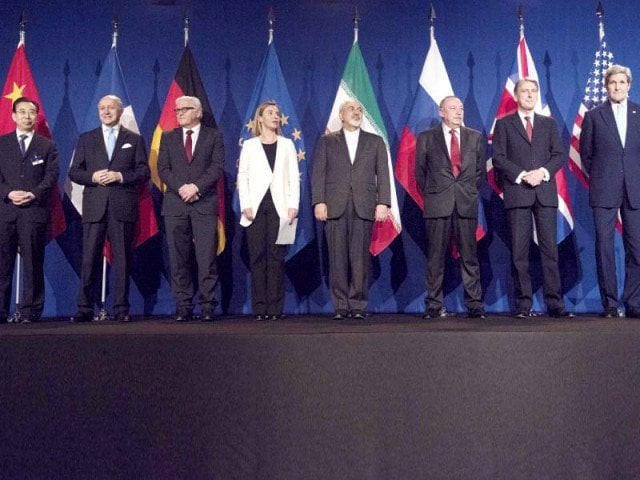A tentative nuclear deal
It is hoped that Pakistan-Iran gas pipeline project would culminate as soon as trade sanctions are lifted against Iran

Foreign ministers and secretaries pose fro a group photo after Iran nuclear programme talks in Lausanne, Switzerland. PHOTO: AFP

US President Barack Obama has very rightly said: “This deal is not based on trust. It’s based on unprecedented verification.” In return, the US and the European Union (EU) will terminate all nuclear-related economic sanctions on Iran once the International Atomic Energy Agency confirms that Iran has complied with the deal. In a joint statement, the EU’s foreign policy chief, Federica Mogherini, and the Iranian Foreign Minister, Mohammad Javad Zarif, hailed what they called a “decisive step” after more than a decade of work. Speaking afterwards, Mr Zarif said the accord showed “our programme is exclusively peaceful, has always been and always will remain exclusively peaceful”, while not hindering the country’s pursuit of atomic energy for civilian purposes.
However, US allies in the Middle East are sceptical, especially Israel and Saudi Arabia. President Obama also faces mounting opposition from lawmakers on Capitol Hill, particularly Republicans, who control both chambers of Congress. The first major test of the understanding is expected to come in the next few days when Secretary of State John Kerry presents the details of the deal to a closed session of the Senate Foreign Relations Committee, before a vote on a bill that would give Congress the power to accept or reject any nuclear agreement and another that would impose new sanctions.
Still, the deal on the framework is welcome news for the region and for Pakistan. Not that Iran did not have legitimate reasons to embark on the nuclear path. It did come out intact in 1989 from the decade-long war with Saddam Hussein’s Iraq, which was being funded by the US and Saudi Arabia; Tehran felt it was being increasingly besieged by the hostile Arab Middle East plus the nuclear- armed Israel. So, it felt it needed to have its own minimum credible nuclear deterrence and went ahead with a clandestine programme to pursue the objective despite being a signatory of the Nuclear Non-proliferation Treaty (NPT). It could not keep the programme from being discovered for long. Not ruling out surgical attacks on its nuclear installations, world powers retaliated by imposing stifling sanctions against Iran. Though its economy kept taking severe blows from the ever-increasing sanctions, Tehran kept resisting the pressure for almost a decade. Sanctions did ruin Iran’s economy but without having any serious impact on its nuclear programme.
However, things started taking a turn for the better after the 2013 Iranian elections when President Hassan Rouhani appeared on the scene. Since then, talks between the world powers and Iran began in right earnest for a negotiated settlement. The anticipated thaw in the US-Iran relations as a consequence, one hopes, would have a calming effect not only on the Middle East’s heightened sectarian rivalry but also on our borders with Iran along Balochistan. And it is also hoped that in the immediate run, the Pakistan-Iran gas pipeline project would finally reach its culmination as soon as trade sanctions are lifted against Iran.
Published in The Express Tribune, April 6th, 2015.
Like Opinion & Editorial on Facebook, follow @ETOpEd on Twitter to receive all updates on all our daily pieces.















COMMENTS
Comments are moderated and generally will be posted if they are on-topic and not abusive.
For more information, please see our Comments FAQ